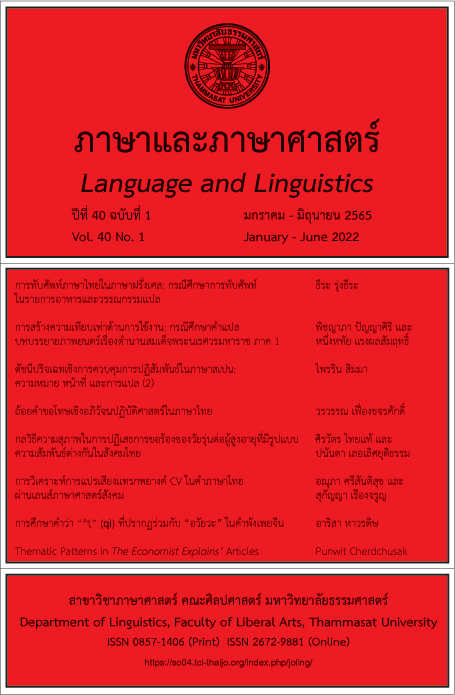Apologetic Metapragmatic Comments in Thai
Main Article Content
Abstract
People usually apologize not only for their actions but also for their language behavior that may have insulted or offended. This research focuses on the use of an apologetic formula in Thai, called “apologetic metapragmatic comments (AMC)”, which reflects the speaker’s awareness of the effects of language use regarding the aspect of appropriateness. The objectives of this study are to identify the interactional functions of AMC in Thai and to examine the presentation of the multiple selves of the speaker in AMC situations. Drawing upon the data collected from Thai TV dramas, the results show that there are five functions of AMC: 1) realigning relationships with the offended parties, 2) mitigating an offence, 3) refusing and/or expressing disagreement, 4) interrupting the conversation, and 5) initiating conflict. It also suggests that AMC are not only used as remedial actions aimed at fixing intersubjective conflicts but also used to attack or challenge the hearer’s face.
Article Details

This work is licensed under a Creative Commons Attribution-NonCommercial-NoDerivatives 4.0 International License.
บทความทุกบทความเป็นลิขสิทธิ์ของภาษาและภาษาศาสตร์
References
ทรงธรรม อินทจักร. (2550). แนวคิดพื้นฐานด้านวัจนปฏิบัติศาสตร์. สำนักพิมพ์มหาวิทยาลัยธรรมศาสตร์.
วรวรรณ เฟื่องขจรศักดิ์, ชัชวดี ศรลัมพ์, และทรงธรรม อินทจักร. (2560). การตระหนักรู้เชิงอภิวัจนปฏิบัติศาสตร์ในการสนทนากลุ่มของผู้ใช้ภาษาชาวไทย. ภาษาและภาษาศาสตร์, 36(1), 62-96.
Aoki, A. (2010). Rapport management in Thai and Japanese social talk during group discussions. Pragmatics, 20(3), 289-313.
Blum-Kulka, S., House, K., & Kasper, G. (Eds.). (1989). Cross-cultural pragmatics: Requests and apologies. Ablex.
Brown, P., & Levinson, S. (1987). Politeness: Some universals in language usage. Cambridge University Press.
Bublitz, W., & Hübler, A. (Eds.). (2007). Metapragmatics in use. John Benjamins.
Caffi, C. (1998). Metapragmatics. In J. L. Mey (Ed.), Concise encyclopedia of pragmatics (pp. 581-586). Elsevier.
Culpeper, J. (2011). Impoliteness. Cambridge University Press.
Culpeper, J., & Haugh, M. (2014). Pragmatics and the English language. Palgrave Macmillan.
Deutschmann, M. (2003). Apologising in British English. Umeå Universitet.
Goffman, E. (1981). Forms of talk. University of Pennsylvania Press.
Hofstede, G. (2011). Dimensionalizing cultures: The Hofstede model in context. Online Readings in Psychology and Culture, 2. http://dx.doi.org/10.9707/2307-0919.1014.
Hübler, A. (2011). Metapragmatics. In W. Bublitz & N. Norrick (Eds.), Foundations of pragmatics (pp. 107-131). De Gruyter.
Leech, G. (2014). The pragmatics of politeness. Oxford University Press.
Lucy, J. (1993). Reflexive language. Cambridge University Press.
Maynard, S. K. (2002). Linguistic emotivity: Centrality of place, the topic-comment dynamic, and an ideology of pathos in Japanese discourse. John Benjamins.
Owen, M. (1983). Apologies and remedial Interchanges: A study of language use in social interaction. Mouton Publishes.
Overstreet, M. (2010). Metapragmatics. In L. Cumming (Ed.), The pragmatics encyclopedia (pp. 266-268). Routledge.
Overstreet, M., & Yule, G. (2002). The metapragmatics of ‘and everything’. Journal of Pragmatics, 34(6), 785-794.
Pizziconi, B. (2007). Facework and multiple selves in apologetic metapragmatic comments in Japanese. In W. Bublitz & A. Hübler (Eds.), Metapragmatics in use (pp. 49-72). John Benjamins.
Searle, J. R. (1970). Speech acts: An essay in the philosophy of language. Cambridge University Press.
Silverstein, M. (1993). Metapragmatic discourse and metapragmatic function. In J. Lucy (Ed.), Reflexive language: Reported speech and metapragmatics (pp. 33-58). Cambridge University Press.
Sugito, S. (1989). Gengokoudou ni tsuite no kimarikotoba. Nihongogaku, 8, 4-14.
Tanskanen, S. (2007). Metapragmatic utterances in computer-mediated interaction. In W. Bublitz & A. Hübler (Eds.), Metapragmatics in use (pp. 87-106). John Benjamins.
Taylor, C. (2016). Mock politeness in English and Italian. John Benjamins.
Verschueren, J. (2000). Notes on the role of metapragmatic awareness in language. Pragmatics, 10(4), 439-456.


